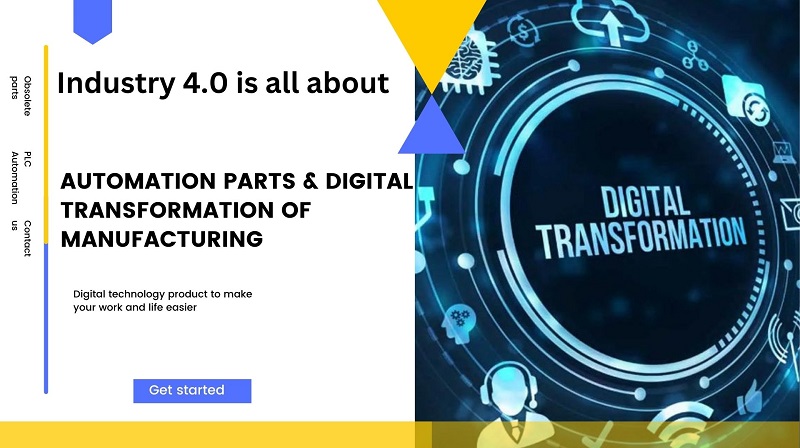
Industry 4.0 is all about Automation Parts and Digital Transformation of Manufacturing
- by PLC
- Apr 24, 2023
The fourth industrial revolution, sometimes known as "Industry 4.0," is characterised by the incorporation of cutting-edge digital technology into the production process. The Internet of Things (IoT), automation, AI, ML, and other cutting-edge technologies fall under this category.
Industry 4.0 seeks to develop "smart factories" that are more effective, productive, and customer-responsive. Many components of the manufacturing process may be digitised and automated, which helps businesses cut costs, boost quality, and shorten time to market. Additionally, Industry 4.0 gives businesses the ability to gather and analyse enormous volumes of data in real-time, facilitating better predictive maintenance and data-driven decision-making.
Industry 4.0, as a whole, represents a huge change in the way that production is carried out, and it is anticipated to have a big effect on the sector in the years to come.
The incorporation of cutting-edge technology into the manufacturing process, such as robots, artificial intelligence, machine learning, the Internet of Things (IoT), and other new technologies, is referred to as automation and digital transformation of manufacturing. As a result, manufacturing processes may be more effective, productive, and flexible, as well as have better quality control and spend less money.
Automation is the process of using hardware and software to carry out operations that were previously completed by humans. This can involve activities including packing, assembly, and quality control. Both high-volume and low-volume manufacturing processes can benefit from automation, which can lower mistakes, boost uniformity, and boost productivity.
The use of digital technology to enhance or fully alter current business processes is referred to as "digital transformation." This may be done in the manufacturing industry by using data analytics, machine learning, and IoT devices to continuously monitor and improve production processes. This may enhance supply chain management, boost operational efficiency, and identify possible issues before they arise.
Automation and digital transformation are transforming production, transforming it into a speedier, more adaptable, and more responsive industry to changing consumer requirements. Manufacturers may increase production, quality, and profitability by adopting these technologies.
The fourth industrial revolution, known as Industry 4.0, is centred on the use of automation and the digitalization of industry. Industry 4.0 involves integrating cutting-edge digital technology into the production process to build "smart factories" that are more effective, productive, and responsive to consumer requests.
Automation and digital transformation enable manufacturers to achieve the following benefits in Industry 4.0:
1. Increased Efficiency: Robotics and other forms of automation in the industrial industry may speed up and improve the precision of production while lowering costs and waste. Digital technology may also aid in process optimisation and downtime reduction, increasing efficiency.
2. Improved Quality: By lowering the possibility of human mistake and enabling real-time monitoring and analysis of manufacturing processes, automation and digital transformation can assist to enhance product quality.
3. Enhanced Flexibility: By modifying manufacturing processes in real-time, digital technologies like cloud computing and IoT devices allow firms to quickly respond to changing market needs.
4. Greater Customization: Manufacturing companies may now produce highly individualised goods that are tailored to the demands of each consumer thanks to the integration of digital technology.
5. Improved Sustainability: By maximising the use of energy and resources and minimising waste, automation and digital transformation may assist manufacturers in lowering their environmental impact.
Overall, Industry 4.0's success depends on the utilisation of automation and digital manufacturing transformation, which enables manufacturers to significantly increase productivity, quality, flexibility, and sustainability.












